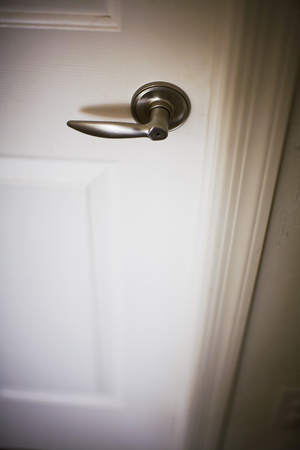Have Confidence.
If you feel like you don’t have the right to be there, your prospect will smell it from a mile away, and nine times out of ten he will cut you off and slam the door in your face. You do have the right to be there. Sales make our economy go. You have to make a living. Some of the people living behind those doors might well be in sales themselves. You will find rude people, but you will also find friendly people and people who are simply neutral.
Don’t Try to Sell At the Door.
A common mistake is to try to sell the product right at the door. This overwhelms the prospect and puts them off. Instead it is better to say something like this:
“I’m sorry to disturb you. I’m (your name) from (company). I’m here because my company is offering (products/service) in this neighborhood and I wanted to see if I could set up a time to discuss it with you. If you have some time right now I’d be happy to step inside and go over what we have, or if you prefer I will be back in this area on Tuesday or Thursday. Which one would be better for you?”
What have you done here? First, you’ve relieved the prospect of the pressure of possibly having to buy something or turn something down right now. Nine times out of ten, if someone feels pressured to buy, they won’t. You’ve also apologized for disturbing them, hopefully relieving some of their annoyance. Finally you never offered them the option to say “no.” You offered them the option of dates and times. Now if they have any interest or curiosity about your product or service at all, they will probably choose out one of the options, or suggest an alternate. If they don’t, and they still say they aren’t interested, you can believe them and walk away knowing you didn’t spend a lot of time on someone who wasn’t going to buy anyway.
How many appointments do you need daily, weekly, or monthly to make your sales goals? This depends on what your goals are, and what your close rate is, and how long a presentation takes you. Your sales manager can help you come up with the realistic and expected figure, but I found that 35-40 appointments a month was realistic and got me to goal. You’re not going to be able to present to all of those 35-40 appointments, because some will no show. Of those you do see, you may only close a certain percentage. Still, if you understand the fact that these things are going to happen, you will not surprise yourself, or trick yourself into doing less and less work because you were sure that one prospect was going to sell. Sales is the one place where the law of diminishing returns actually works. The more people you see, the more chances you give yourself to sell. The more chances you give yourself, the more likely it is you’ll actually do it. You won’t get killed by rejection, because you know you have already done the work necessary to move on and do what you have to do.
Time Management is Key.
One trap novice salespeople fall into is failing to manage their time. You should never approach a door without a day planner in hand. That will allow you to write down the name, address, and appointment time of the person you meet up with. You can then plan your drive time and make sure you schedule enough time between appointments. You also want to make sure you’re scheduling enough blocks of time in that are devoted solely to your door to door prospecting. Write down where you’re going to prospect and for how long in your planner, stick to it, and do not schedule anything into that time. If you don’t do this you’ll find that you fill up week one with appointments, but don’t take any time to fill up week two. This creates the up and down, feast or famine nature of sales and will often cause you to miss your goals, which only erodes your confidence and makes it that much harder to get out the next time.
Site Management is Key.
No matter what you sell, if you’re going door to door you might want to keep a notebook of the neighborhoods you visit and the addresses in them. This gives you an idea of what you’ve done and already accomplished. If you get a “Not Interested” you can simply mark “NI” in your little book next to the address. If there’s no answer you can leave it blank and knock the door again when you’re next in the neighborhood (perhaps after the appointment you’ve already set there). You can note if you set an appointment at a house, or sold it. You can note if the house is vacant, and the date. If your business is particularly time sensitive to new movers, and you visit the neighborhood with any regularity, you’ll be able to use, with confidence, a line like, “I know you just moved in recently,” and know that the prospect is going to be a little more qualified than some others you may visit. You can find out if the addresses are already in the customer database if that is how your company works, and can avoid knocking on the doors of those who already have your product or service. (If a database is what tells you it might be wise to go ahead and spend a day setting up a site notebook, casing neighborhoods, and then sitting down to compare them to the database house by house). You will thank your record keeping later when you can approach every house with confidence, knowing what has already gone on there, and if territories change other sales reps on your team will thank your good record keeping if you’re able to pass such a notebook on to them, with what has gone on before clearly marked out.
This also keeps you from wasting any more time or gas than you have to. You can pick neighborhoods that are close to each other, and sooner or later you’ll know what’s going on. What’s more, neighbors do talk. You might find yourself working referrals in the neighborhood, and if you are a common, weekly sight in these neighborhoods you might find lowered resistance to your presence.
Work Smart.
Door knocking doesn’t work when the people you’re trying to reach aren’t going to be home. At 11 a.m. on a Monday your prospects are busy at their jobs, so you may as well find other uses for that time (like appointments, or paperwork, or whatever). Instead, the best prospecting times are in the evenings as people start to get home from work till about 8:30 or 9:00 at night. I usually stop at 8:30 simply because my upbringing says it’s rude to knock on a door any later. Saturdays are the other key times. Sundays may theoretically be good times, but I always avoided them out of my own personal feeling that Sundays are sacred and should not ever involve a sales rep.
Expect Success!
Door knocking can seem harrowing at first, but the more you practice the less it will intimidate you. After awhile, cold calling can even be fun! It is a definite rush when you make those appointments and score those sales, when you stop worrying if you will sell and simply do the activities that it takes to sell.



